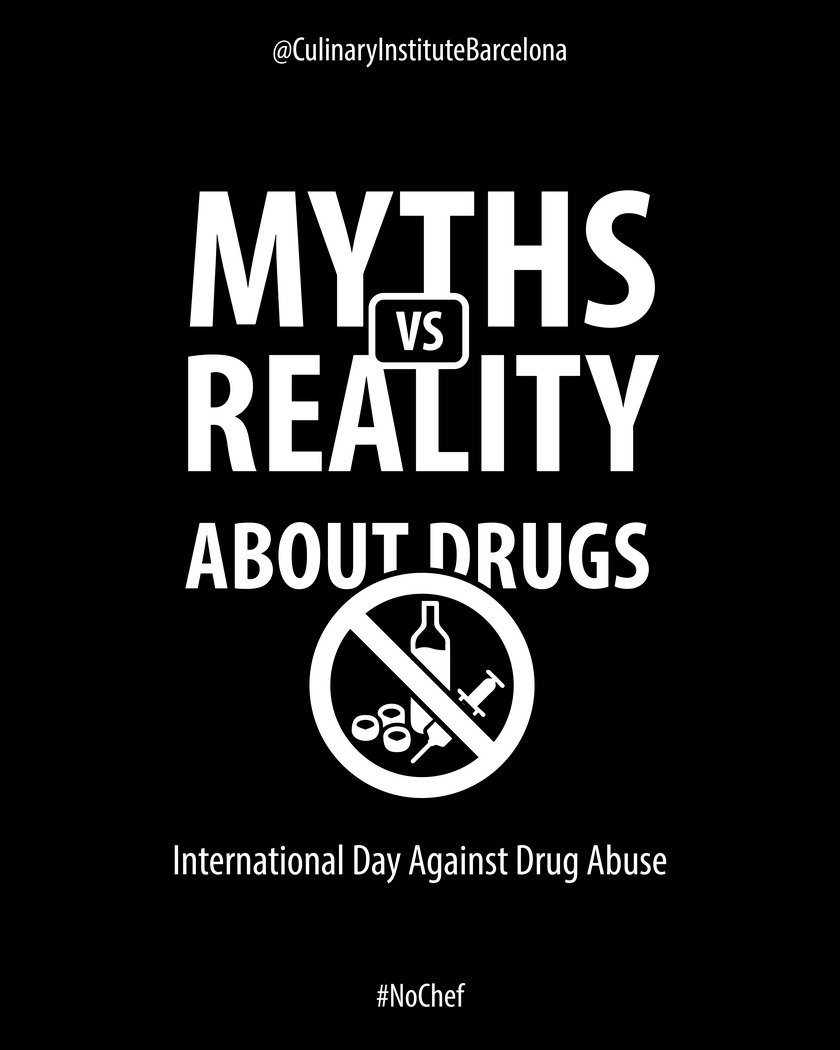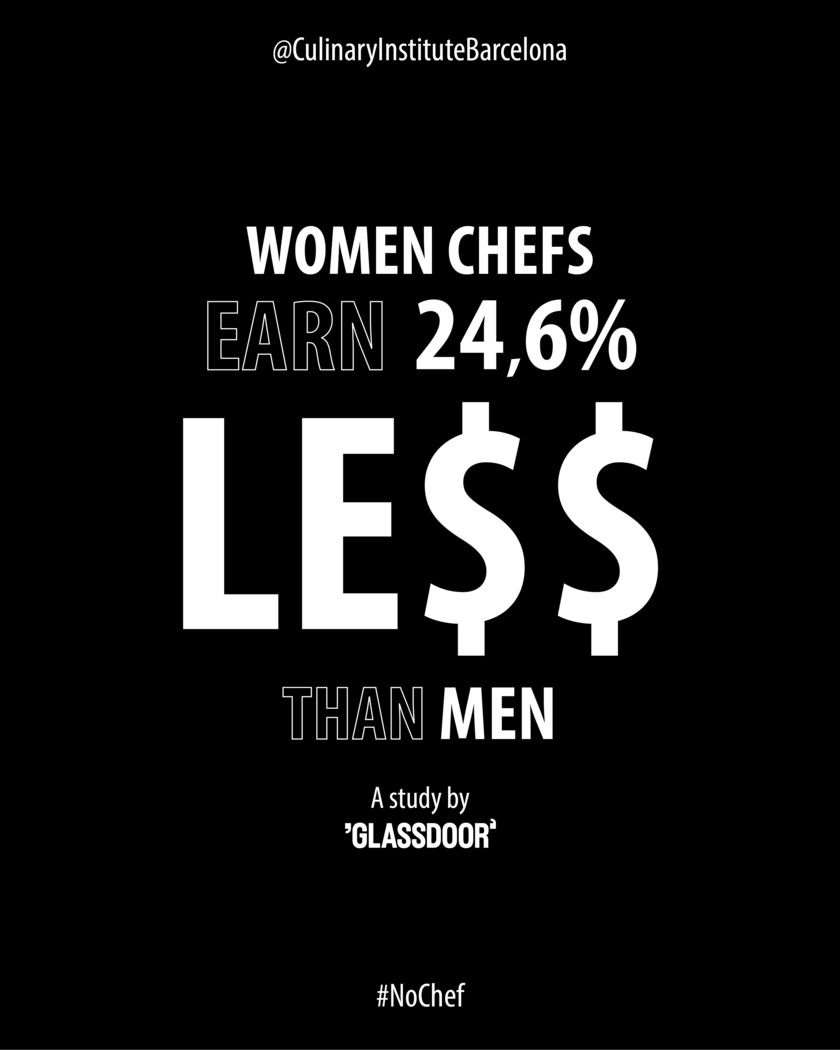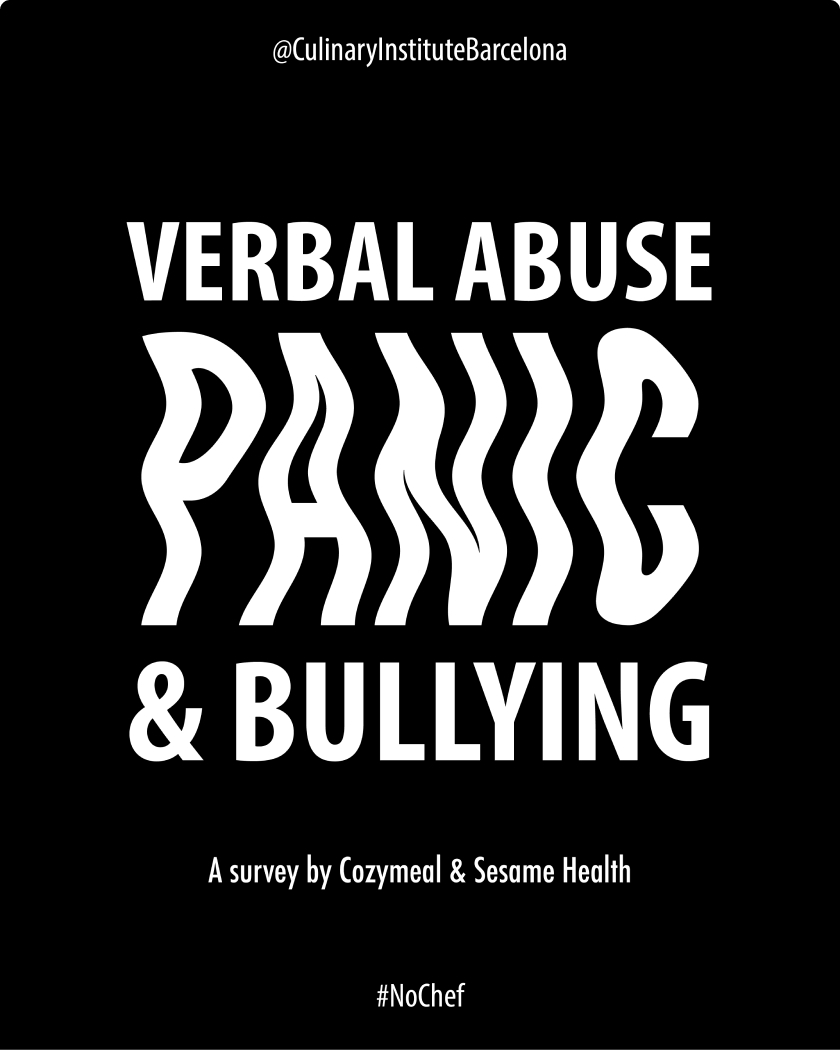#NoChef
The world of professional cooking has been romanticized to the point of exhaustion. So much so that the figure of the chef has come to be seen as a superman or superwoman through their discipline, creativity, and passion for cooking. However, this façade hides a bitter reality that affects thousands of workers: labor exploitation, mistreatment, addiction, discrimination, and constant pressure.
For this reason, this year we continue to use our strength to tell the realities as they are. Many of these issues are experienced and reported in other professions, but they are normalized in kitchens. This time, the city of Barcelona is our voice to advocate for change.
There is still a long way to go before we can celebrate a Chef’s Day (20th October) in a dignified manner, where they are valued for the quality of their work and not for their ability to survive at the expense of their rights.
#NoChef
Discover all the realities that coexist within a kitchen. Click to explore them and share with your network to join the change.
What is: “No, Chef!”?
The world exists in duality, and the world of gastronomy is no exception. On one hand, there are collapsing chefs, closed restaurants, inadequate wages, violence, and excess. On the other hand, there are more restaurants than ever, along with glamour, wealth, fame, and success.
Is it possible for some to have so much without the subjugation of others?
Most kitchens are not the idyllic places portrayed in reality shows or TV series, where chefs work creatively and harmoniously to deliver excellent service. More often than not, kitchens can resemble a nightmare, filled with shouting, harsh words, and authoritarian commands that infiltrate daily life.
The famous “Yes, chef!”—a phrase inherited from the military, complete with uniforms and stripes—grates against a world that is increasingly global, diverse, empathetic, and sustainable. This is why, at the Culinary Institute of Barcelona, we firmly assert “NO; CHEF!” in our collaborative effort to build a new paradigm.
As a culinary school, we feel compelled to inform our students about the realities that prevail in most kitchens today. However, as an educational institution, our mission is to impart values, skills, and tools that prepare them to lead the necessary changes to transform the future.
Our students come from all over the world, driven by a profound passion for gastronomy and a desire to effect change through their own projects beyond merely cooking. Our mission is to equip them to achieve this goal, enabling them to shape their destinies with values and ethics that enhance their lives, their teams, and the world.
This compelled us to question many things, leading to the launch of “NO, CHEF!” with the aim of challenging the entrenched status quo in the sector and beginning to turn the dry soil to allow new ways of understanding and dedicating oneself to this profession to flourish.
From the moment a student steps into the CIB, our goal is to transform them as individuals. We focus on helping them develop judgment, critical thinking, and the ability to question and tackle challenges. We teach them humility, but we also teach them to lead. We emphasize that to achieve greater heights, they must do so with a team that trusts them. We teach them that for everyone to succeed, success must be collective.
Leaving behind what has been learned to embrace new knowledge is not always easy, but it is the only way to progress. Otherwise, we will merely repeat the mistakes of the past.
¡NO, CHEF!
A cooking school should not only teach how to cook. At the CIB, we teach our students that the gastronomy sector is changing and that they are the driving force behind this change. The survival of restaurant businesses should not depend on the exploitation of working hours or the freedom of their workers.
At the CIB, we train our students to create environments where mutual respect is a priority, rejecting any form of abuse from clients towards workers.
We teach our students that it is not possible to design or maintain a business that pays its workers poorly. Such a business should not exist.
The image of the chef as a rock star living life on the edge should remain in the past. When these situations or environments arise, our CIBers will be equipped to confront them, thanks to the skills acquired during their training and the mental health sessions that provide them with tools to recognize risky situations.
At the CIB, we promote interculturality in our classrooms, where students from diverse cultures learn to work together, breaking down barriers and fostering mutual respect. We believe that diversity is key to combating discrimination and enriching the workplace environment.
At CIB, we strive to eradicate sexism in gastronomy, with a student cohort that consists of 50% women, promoting equal opportunities and female leadership from the start of their training.
At the CIB, we promote an inclusive and safe environment that respects and celebrates the diversity of sexual orientation and gender, training professionals committed to equality and respect in the gastronomy sector.
At the CIB, we address mental health comprehensively, offering a dedicated course that provides tools to help our students manage stress and care for their emotional well-being in the gastronomy environment.
At CIB, we teach our young students to recognize and reject any form of labor abuse, empowering them to demand respect and fair conditions from the very beginning of their careers.
A cooking school should not only teach how to cook. At the CIB, we teach our students that the gastronomy sector is changing and that they are the driving force behind this change. The survival of restaurant businesses should not depend on the exploitation of working hours or the freedom of their workers.
At the CIB, we train our students to create environments where mutual respect is a priority, rejecting any form of abuse from clients towards workers.
We teach our students that it is not possible to design or maintain a business that pays its workers poorly. Such a business should not exist.
The image of the chef as a rock star living life on the edge should remain in the past. When these situations or environments arise, our CIBers will be equipped to confront them, thanks to the skills acquired during their training and the mental health sessions that provide them with tools to recognize risky situations.
At the CIB, we promote interculturality in our classrooms, where students from diverse cultures learn to work together, breaking down barriers and fostering mutual respect. We believe that diversity is key to combating discrimination and enriching the workplace environment.
At CIB, we strive to eradicate sexism in gastronomy, with a student cohort that consists of 50% women, promoting equal opportunities and female leadership from the start of their training.
At the CIB, we promote an inclusive and safe environment that respects and celebrates the diversity of sexual orientation and gender, training professionals committed to equality and respect in the gastronomy sector.
At the CIB, we address mental health comprehensively, offering a dedicated course that provides tools to help our students manage stress and care for their emotional well-being in the gastronomy environment.
At CIB, we teach our young students to recognize and reject any form of labor abuse, empowering them to demand respect and fair conditions from the very beginning of their careers.
At the CIB · Culinary Institute of Barcelona, we believe in the educational field as a catalyst for change. We instill these values in our students and make them active participants and proponents of this initiative. As future leaders of the sector, their voices and opinions will help to destigmatize this reality.
Stand for
With your support, you’ll not only carry the movement with you wherever you go, but also help us continue the fight to elevate the dignity of the chef’s role.
#CookingTomorrow
We are born from change, and we don’t stop doing it. Those who do not change do not evolve, and teaching should be serve this purpose: to teach how to evolve.
Drug use is not a game. What you think one day can take your mind off your problems can turn into your worst nightmare.
Today is the International Day Against Drug Abuse and we have answered some of the myths surrounding this global issue. Moreover, it is still a common situation in the restaurant industry and it is the duty of all schools to provide the tools to identify and avoid these behavioural and emotional management patterns.
Go to Instagram
It is not clickbait, it is a reality.
It is not an isolated situation, it is a systematic violation of women\'s rights.
It is not a question of asking for more, it is a question of commitment to equality.
The salary gap between men and women is still very present in the 21st century.
Go to Instagram
Verbal abuse, panic and bulling. These are the results of a survey on the chef profession conducted by Cozymeal & Sesame Health.
Numbers don\'t lie. It is urgent to put an end to the violations of moral and labor rights that occur in the culinary sector.
Go to Instagram
We face significant challenges, and we know that your voice is essential in achieving a fairer future. It is no longer enough to merely observe and identify what is wrong.
Join the movement by sharing your experience, taking action, or simply staying updated on all our initiatives.



